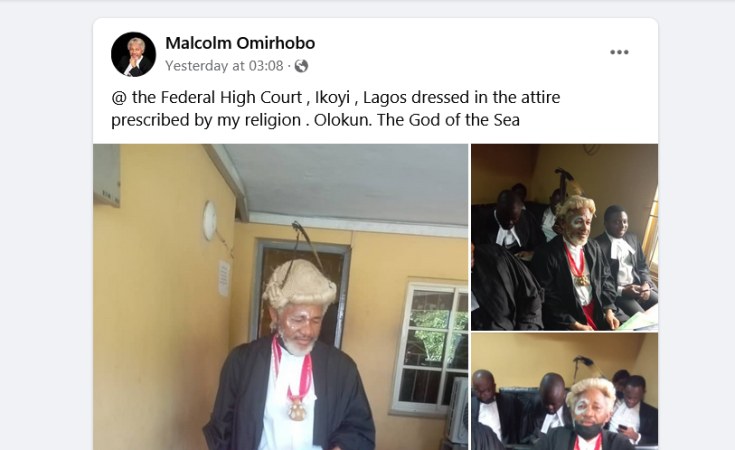Mr Omirhobo had a red cloth wrapped across his waist, traditional beads hung on his neck, and his lawyer's robe draped across him.
A human rights lawyer and activist, Malcolm Omirhobo, appeared before a judge at the Lagos Division of the Federal High Court on Monday dressed as a traditionalist.
Mr Omirhobo had a red cloth wrapped across his waist, traditional beads hung on his neck, and his lawyer's robe draped across him.
He had appeared in a similar fashion at the Supreme Court last week.
His actions came following the recent decision of the apex court that female Muslim students in Lagos should be allowed to wear hijab to school.
The lawyer, who hails from Delta State, described his dressing as one usually worn by Olokun worshippers.
It was gathered that his colleagues in the Lagos court looked amused as he took his seat to await the day's proceedings to begin.
The lawyer was appearing before Tijani Ringim over two matters, but the judge insisted he must first address the court on why he should dress in that manner.
"You cannot address the court like this as a professional," The Cable quoted the judge as saying.
"I will adjourn your matter and you come and address the court if the rules allow you to appear in court like this."
Mr Ringim adjourned the hearing to October 10, 2022.
Supreme Court ruling
The case involved the Lagos State Government as the appellant and Asiyat AbdulKareem (through her father), Moriam Oyeniyi, and the Muslim Students' Society of Nigeria as the respondents.
Judge Grace Onyeabo of the Lagos State High Court had in a judgement, on October 17, 2014, upheld the state government's decision to ban the use of hijab in public primary and secondary schools in the state.
But the High Court's decision was upturned by the Lagos Division of the Court of Appeal in a judgement delivered on July 21, 2016.
In a unanimous judgement, the appeal court panel ruled that the ban on the use of hijab in public schools in the state was discriminatory against Muslim pupils.


